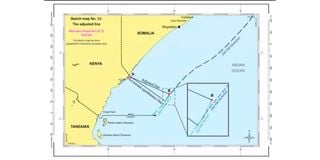Premium
The sun was not allowed to shine in reporting Somalia v Kenya case

This was shown on screen during ICJ judgement on the Kenya-Somalia maritime border case. The red dots show the new borderline declared by the court.
What you need to know:
Kenyans relied on the media for surveillance on the maritime border dispute with Somalia.
Because of the incomplete stories by the media, many issues were left in darkness.
One of the important functions of the media is surveillance — to keep citizens informed of what is happening around them and the dangers and opportunities they face. To do this effectively, journalists rely on a formula called the ‘Five Ws and one H’ — who, what, when, where and why. Sometimes a sixth question, ‘how’, is added to the formula. A story can only be considered complete if it answers those questions.
Kenyans relied on the media for surveillance on the maritime border dispute with Somalia. In general, the media failed to frame the stories in such a way that they could provide complete information to enable citizens to determine what the risks were and whether the government functionaries were managing the case well.
Because of the incomplete stories by the media, many issues were left in darkness — such as why a string of foreigners were hired to represent Kenya at the International Court of Justice (ICJ) and why officials failed to attend some meetings in Mogadishu. In addition, the law of the sea wasn’t explained well.
Kenya has a history of lawyers skilled in the law of the sea. In the 1970s, Kenyan diplomats and international law scholars, Prof Frank X. Njenga and Dr Andronico Adede, played a very important role in the development of the United Nations Convention on the Law of the Sea, the international agreement that establishes a legal framework for all marine and maritime activities.
The media largely chose to rely on official statements instead of instead of ferreting out the facts on their own. No wonder, the outcome of a case that was largely predictable stunned many Kenyans when the ICJ read its judgment on Tuesday.
The ICJ awarded much of Kenya’s continental shelf and what the country considers as its territorial waters to Somalia. That left Kenya technically landlocked with its exclusive economic zone substantially reduced, its economic activities in the sea curtailed and its defence vantage and access to the sea almost decimated.
Settlement of the dispute
Acres of print on the case have been produced since April 7, 2009, when Kenya and Somalia signed a Memorandum of Understanding that sets out the agreed procedure for the settlement of the dispute. But when Somalia finally brought the case to the ICJ and won, Kenyans were caught unawares.
The media is largely to blame for this.
Some of the media stories were not framed to provide the information the reader needed to understand the case and its possible outcomes. So, all most Kenyans know about the case seems to be what is captured in jingoistic reactions — such as Taifa Leo’s frontpage headline yesterday: “Somalia: Asante ya punda mateke” (Somalia, you are thanking us with the kicks of a donkey).
True, some of the stories attempted to go beyond official communiques but they were too little too late. Chepkorir Sambu’s article, “Kenya weak in border row, try other possibilities” (Nation, June 27, 2019), was one of the few early articles that shone some sunlight into the border row, relying on legal texts as opposed to what Nairobi was telling citizens.
Brian Wasuna’s “How Kenya walked into a trap in border row with Somalia” (Nation, October 13, 2021), is one of the stories that came too late to explain how Kenya mismanaged the case. “While Somalia was preparing to put up the fight of its life in the United Nations court, Kenya was still optimistic that talks would resolve the dispute,” he states.
“In a move that cooked Kenya’s goose, the Nairobi government agreed to participate in the case filed at the ICJ. Had Kenya refused to recognise the ICJ’s jurisdiction at the time, the case would likely not have proceeded to Tuesday’s defeat for Nairobi. From then on, Kenya kept on delaying the inevitable in seeking adjournment after adjournment.”
Had all the Five Ws and one H been answered completely in the media reporting of the case from the word go, there would be less anxiety and jingoism today. And perhaps the zero-sum outcome, and sabre-rattling, might have been avoided altogether.
The Public Editor is an independent news ombudsman who handles readers’ complaints on editorial matters including accuracy and journalistic standards. Email: [email protected]. Call or text 0721989264.





